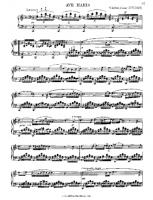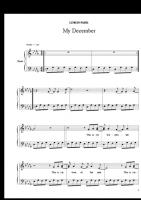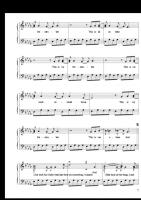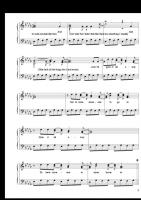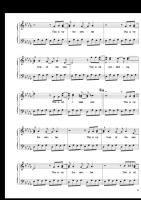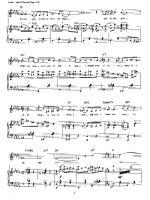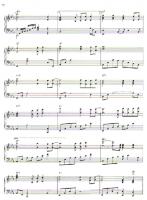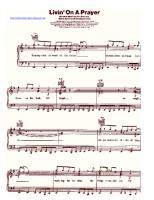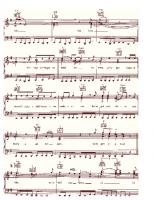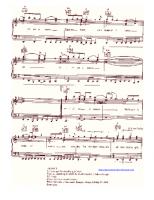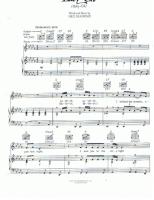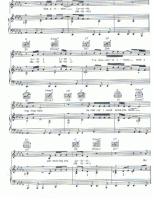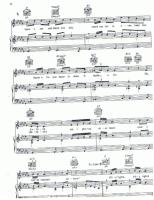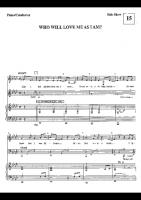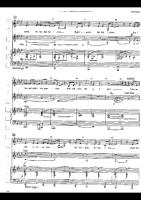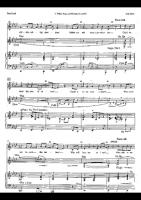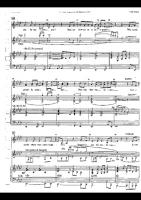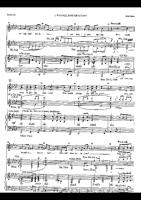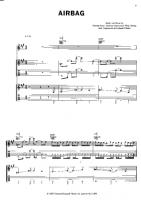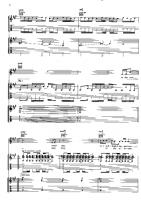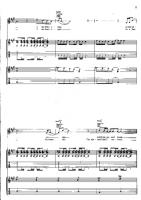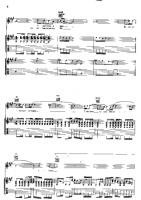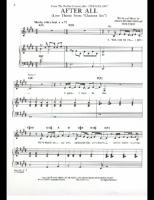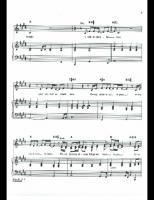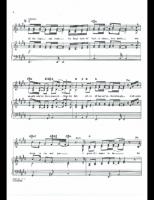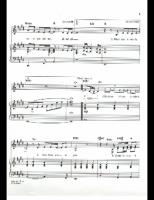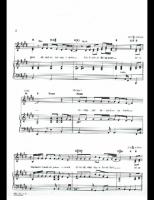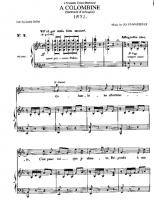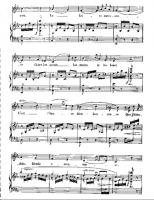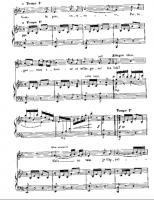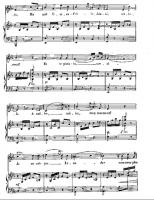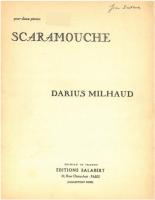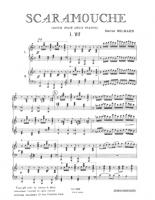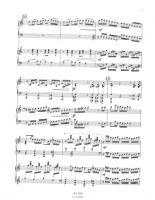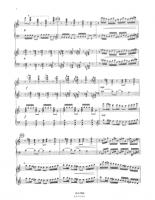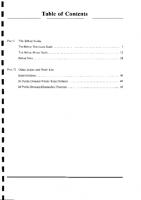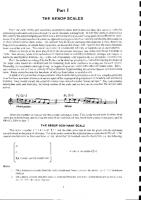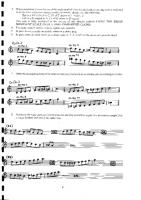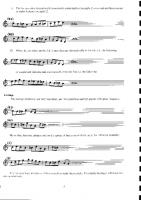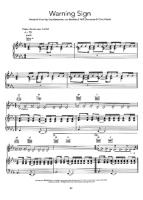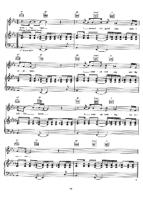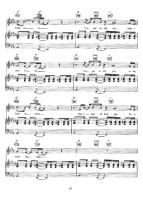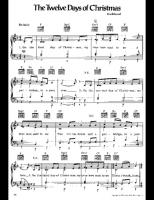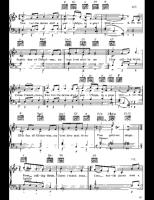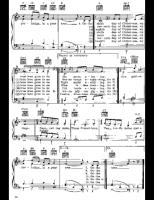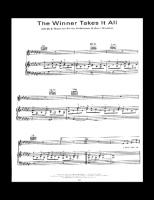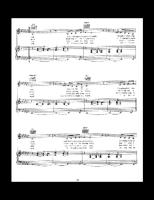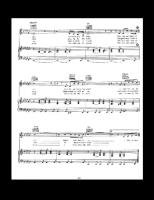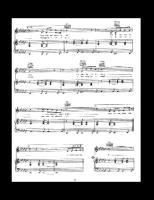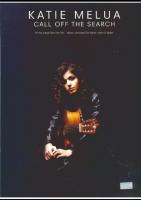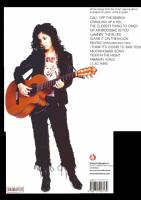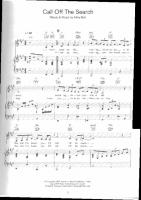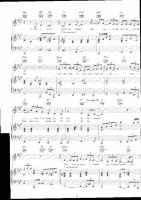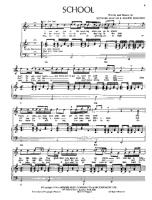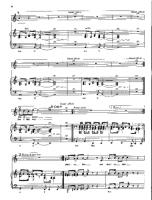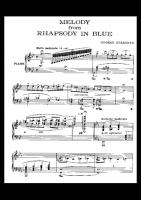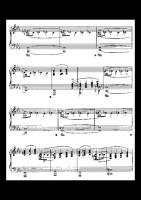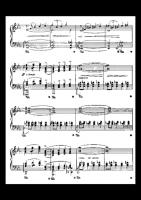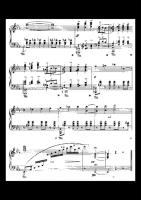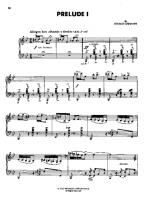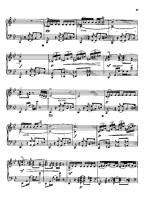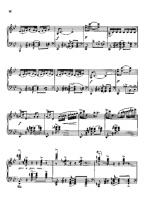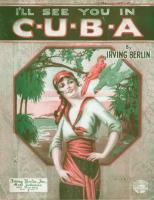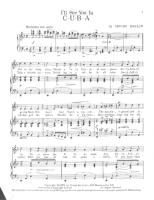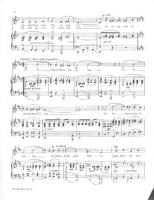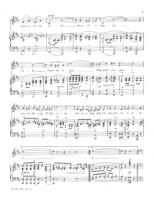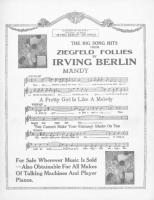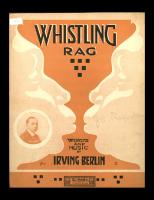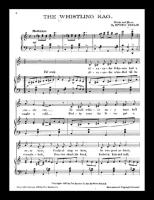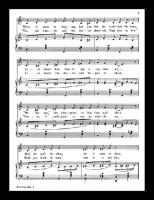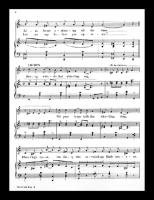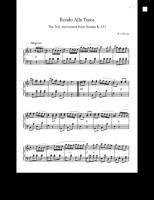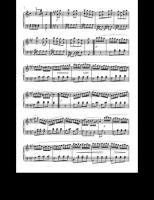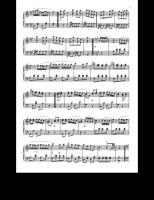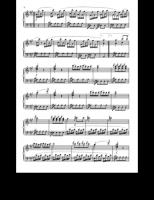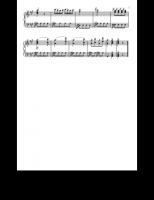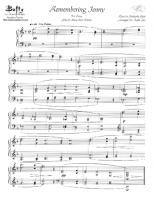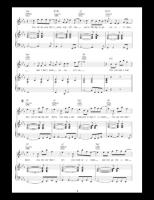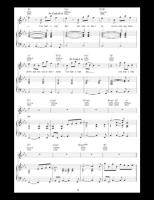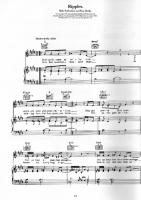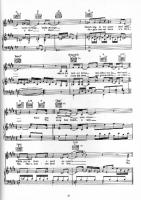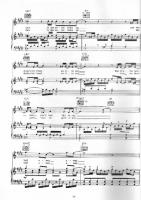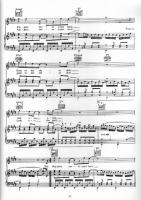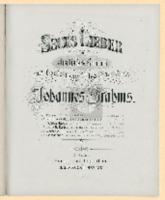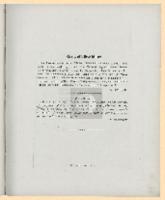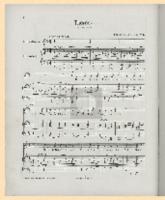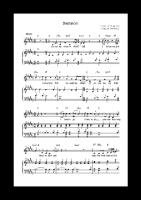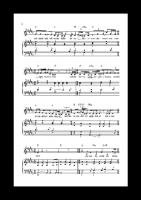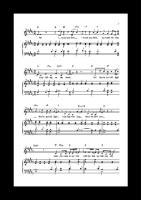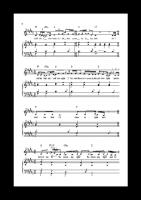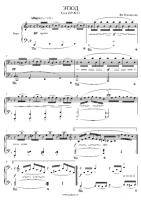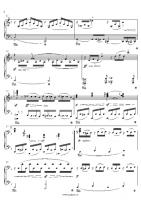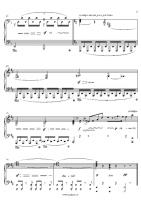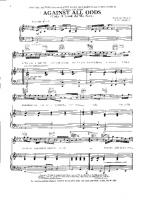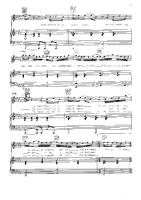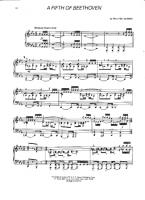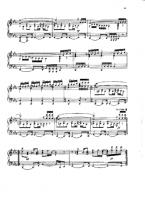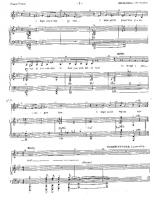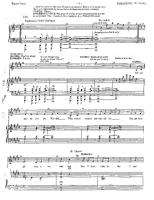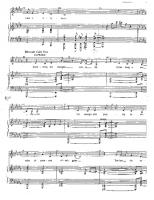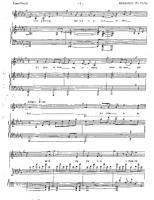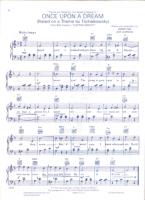Piano Sheet Music
 "... the appearance of Mr. Segovia is not that of the trumpeted virtuoso. He is rather the dreamer or scholar in bearing, long hair, eyeglasses, a black frock coat and neckwear of an earlier generation. He seats himself, thoughtfully, places his left foot on its rest, strikes a soft chord, then bends over his guitar and proceeds to play like the poet and master he is of the instrument." New York Times , Jan. 9, 1928
"... the appearance of Mr. Segovia is not that of the trumpeted virtuoso. He is rather the dreamer or scholar in bearing, long hair, eyeglasses, a black frock coat and neckwear of an earlier generation. He seats himself, thoughtfully, places his left foot on its rest, strikes a soft chord, then bends over his guitar and proceeds to play like the poet and master he is of the instrument." New York Times , Jan. 9, 1928
Franz Schubert
 Franz Peter Schubert (German pronunciation: ; January 31, 1797 – November 19, 1828) was an Austrian composer. He wrote some 600 Lieder, nine symphonies (including the famous "Unfinished Symphony"), liturgical music, operas, some incidental music, and a large body of chamber and solo piano music. He is particularly noted for his original melodic and harmonic writing.
Franz Peter Schubert (German pronunciation: ; January 31, 1797 – November 19, 1828) was an Austrian composer. He wrote some 600 Lieder, nine symphonies (including the famous "Unfinished Symphony"), liturgical music, operas, some incidental music, and a large body of chamber and solo piano music. He is particularly noted for his original melodic and harmonic writing.Schubert was born into a musical family, and received formal musical training through much of his childhood. While Schubert had a close circle of friends and associates who admired his work (amongst them the prominent singer Johann Michael Vogl), wide appreciation of his music during his lifetime was limited at best. He was never able to secure adequate permanent employment, and for most of his career he relied on the support of friends and family. He made some money from published works, and occasionally gave private musical instruction. In the last year of his life he began to receive wider acclaim. He died at the age of 31 of "typhoid fever", a diagnosis which was vague at the time; several scholars suspect the real illness was tertiary syphilis.
Interest in Schubert's work increased dramatically in the decades following his death. Composers like Franz Liszt, Robert Schumann and Felix Mendelssohn discovered, collected, and championed his works in the 19th century, as did musicologist Sir George Grove. Franz Schubert is now widely considered to be one of the greatest composers in the Western tradition.
Rhianna
 Robin Hannah Louise "Rhianna" Kenny (born 7 January 1991, Born in Leeds, Yorkshire, England) professionally known as Rhianna, is an English R&B singer.
Robin Hannah Louise "Rhianna" Kenny (born 7 January 1991, Born in Leeds, Yorkshire, England) professionally known as Rhianna, is an English R&B singer.Born to David and Linda Kenny, Rhianna started her career as a backing vocalist for her brother's band, LSK, but she later dropped out and went solo in her twenties. She signed a recording contract with Sony Music to record her debut album, Get On. Rhianna was fairly popular in the UK and Ireland with her first single, "Oh Baby", but ended her solo career, when her second single charted low in the UK Singles Chart.
Rhianna supported Beverley Knight on her 2003 UK tour, and is currently part of a band called Fleurona.
Linkin Park
 Linkin Park is an American rock band from Agoura Hills, California. Since their formation in 1996, the band has sold more than 50 million albums and won two Grammy Awards. They achieved mainstream success with their debut album, Hybrid Theory, which was certified Diamond by the RIAA in 2005. Their following studio album, Meteora, continued the band's success, topping the Billboard 200’s album charts in 2003, and was followed by extensive touring and charity work around the world.
Linkin Park is an American rock band from Agoura Hills, California. Since their formation in 1996, the band has sold more than 50 million albums and won two Grammy Awards. They achieved mainstream success with their debut album, Hybrid Theory, which was certified Diamond by the RIAA in 2005. Their following studio album, Meteora, continued the band's success, topping the Billboard 200’s album charts in 2003, and was followed by extensive touring and charity work around the world.Recognized for their adaptation of the nu metal and rap rock genre into a radio-friendly yet densely-layered style in Hybrid Theory and Meteora, the band moved away from this and explored a variety of other genres in their latest studio album, Minutes to Midnight. The album topped the Billboard charts and had the third best debut week of any album that year. They are also known for their several collaborations, most notably with rapper Jay-Z in their mash-up album Collision Course, and many other artists on Reanimation.
Cole Porter
 Cole Albert Porter (June 9, 1891 – October 15, 1964) was an American composer and songwriter. His works include the musical comedies Kiss Me, Kate, Fifty Million Frenchmen, DuBarry Was a Lady and Anything Goes, as well as songs like "Night and Day", "I Get a Kick out of You", "Well, Did You Evah!" and "I've Got You Under My Skin". He was noted for his sophisticated, bawdy lyrics, clever rhymes and complex forms. Porter was one of the greatest contributors to the Great American Songbook. Cole Porter is one of the few Tin Pan Alley composers to have written both the lyrics and the music for his songs.
Cole Albert Porter (June 9, 1891 – October 15, 1964) was an American composer and songwriter. His works include the musical comedies Kiss Me, Kate, Fifty Million Frenchmen, DuBarry Was a Lady and Anything Goes, as well as songs like "Night and Day", "I Get a Kick out of You", "Well, Did You Evah!" and "I've Got You Under My Skin". He was noted for his sophisticated, bawdy lyrics, clever rhymes and complex forms. Porter was one of the greatest contributors to the Great American Songbook. Cole Porter is one of the few Tin Pan Alley composers to have written both the lyrics and the music for his songs.
X Japan
 X Japan is a Japanese band founded in 1982 by Toshimitsu "Toshi" Deyama and Yoshiki Hayashi. Originally named X, the group achieved its breakthrough success in 1989 with the release of their second album Blue Blood. They started out as a power/speed metal band and later gravitated towards a progressive sound, at all times retaining an emphasis on ballads. After three more albums, X Japan disbanded in 1997.
X Japan is a Japanese band founded in 1982 by Toshimitsu "Toshi" Deyama and Yoshiki Hayashi. Originally named X, the group achieved its breakthrough success in 1989 with the release of their second album Blue Blood. They started out as a power/speed metal band and later gravitated towards a progressive sound, at all times retaining an emphasis on ballads. After three more albums, X Japan disbanded in 1997.Besides being one of the first Japanese acts to achieve mainstream success while on an independent label, the group is widely credited for pioneering the visual kei movement, though most of the group's members toned down their on-stage attire in later years. They were formerly known for their excessively large hairstyles resembling fountains. As of 2007, the band has sold over twenty million records and over two million home videos.
On 4 June 2007 it was announced the band would reunite with a new song released via digital download in January 2008 and live performances scheduled for March and May.
Stevie Wonder
 Stevie Wonder (born Stevland Hardaway Judkins on May 13, 1950, name later changed to Stevland Hardaway Morris) is an American singer-songwriter, multi-instrumentalist, and record producer. A prominent figure in popular music during the latter half of the 20th century , Wonder has recorded more than thirty top ten hits, won 26 Grammy Awards (a record for a solo artist), plus one for lifetime achievement, won an Academy Award for Best Song and been inducted into both the Rock and Roll and Songwriters halls of fame. He has also been awarded the Polar Music Prize.
Stevie Wonder (born Stevland Hardaway Judkins on May 13, 1950, name later changed to Stevland Hardaway Morris) is an American singer-songwriter, multi-instrumentalist, and record producer. A prominent figure in popular music during the latter half of the 20th century , Wonder has recorded more than thirty top ten hits, won 26 Grammy Awards (a record for a solo artist), plus one for lifetime achievement, won an Academy Award for Best Song and been inducted into both the Rock and Roll and Songwriters halls of fame. He has also been awarded the Polar Music Prize.Blind from infancy, Wonder signed with Motown Records as a pre-adolescent at age twelve, and continues to perform and record for the label to this day. He has nine U.S. number-one hits to his name (on the pop Charts, 20 U.S. R&B number one hits), and album sales totaling more than 150 million units. Wonder has recorded several critically acclaimed albums and hit singles, and writes and produces songs for many of his label mates and outside artists as well. Wonder plays the piano, synthesizer, harmonica, congas, drums, bongos, organ, melodica, and clavinet. In his early career, he was best known for his harmonica work, but today he is better known for his keyboard skills and vocals.
Tchaikovsky
 Pyotr Il'yich Tchaikovsky (May 7 1840 â November 6 1893) was a Russian composer of the Romantic era. While not part of the nationalistic music group known as "The Five", Tchaikovsky wrote music which, in the opinion of Harold Schonberg, was distinctly Russian: plangent, introspective, with modally-inflected melody and harmony.
Pyotr Il'yich Tchaikovsky (May 7 1840 â November 6 1893) was a Russian composer of the Romantic era. While not part of the nationalistic music group known as "The Five", Tchaikovsky wrote music which, in the opinion of Harold Schonberg, was distinctly Russian: plangent, introspective, with modally-inflected melody and harmony.Aesthetically, Tchaikovsky remained open to all aspects of Saint Petersburg musical life. He was impressed by Serov and Balakirev as well as the classical values upheld by the conservatory. Both the progressive and conservative camps in Russian music at the time attempted to win him over. Tchaikovsky charted his compositional course between these two factions, retaining his individuality as a composer as well as his Russian identity. In this he was influenced by the ideals of his teacher Nikolai Rubinstein and Nikolai's brother Anton.
Tchaikovsky's musical cosmopolitanism led him to be favored by many Russian music-lovers over the "Russian" harmonies and styles of Mussorgsky, Borodin and Rimsky-Korsakov.
Nonetheless he frequently adapted Russian traditional melodies and dance forms in his music, which enhanced his success in his home country. The success in St. Petersburg at the premiere of his Third Orchestral Suite may have been due in large part to his concluding the work with a polonaise. He also used a polonaise for the final movement of his Third Symphony.
Bon Jovi
 Bon Jovi is a rock band from Sayreville, New Jersey. Fronted by lead singer and namesake Jon Bongiovi, the group originally achieved large-scale success in the 1980s. Over the past 25 years, Bon Jovi has sold over 120 million albums worldwide, including 34 million in the United States alone.
Bon Jovi is a rock band from Sayreville, New Jersey. Fronted by lead singer and namesake Jon Bongiovi, the group originally achieved large-scale success in the 1980s. Over the past 25 years, Bon Jovi has sold over 120 million albums worldwide, including 34 million in the United States alone. Bon Jovi formed in 1983 with lead singer Jon Bon Jovi, guitarist Richie Sambora, keyboardist David Bryan, bassist Alec John Such, and drummer Tico Torres. Other than the departure of Alec John Such in 1994 (which pared the lineup down to a quartet), the lineup has remained the same for the past 25 years. After two moderately successful albums in 1984 and 1985, the band scored big with Slippery When Wet (1986) and New Jersey (1988), which sold a combined 19 million copies in the U.S. alone, charted eight Top Ten hits (including four number one hits), and launched the band into global super stardom. After non-stop touring, the band went on hiatus after the New Jersey Tour in 1990, during which time Jon Bon Jovi and Richie Sambora both released successful solo albums. In 1992, the band returned with the double platinum Keep the Faith and has since created a string of platinum albums throughout the 1990s and 2000s.
In 2006, the band won a Grammy for best Country Collaboration for "Who Says You Can't Go Home" with Jennifer Nettles from Sugarland and also became the first rock band to reach #1 on the Hot Country Songs chart with the same song. The band has also received multiple Grammy nominations for music from the albums Crush, Bounce, and Lost Highway.
Throughout their career, the band has released ten studio albums, of which nine have gone platinum. In addition, the band has charted 19 singles to the Top 40 of the Billboard Hot 100, four of which reached #1 ("You Give Love a Bad Name", "Livin' on a Prayer", "Bad Medicine", and "I'll Be There for You"). The band also holds the record for the most weeks for a hard rock album at #1 on the Billboard 200 with Slippery When Wet, as well as the most Top 10 singles from a hard rock album, with New Jersey, which charted five such singles.
Neil Diamond
 Neil Leslie Diamond (born January 24, 1941) is an American singer-songwriter and occasional actor.
Neil Leslie Diamond (born January 24, 1941) is an American singer-songwriter and occasional actor.Neil Diamond is one of pop music's most enduring and successful singer-songwriters. As a successful pop music performer, Diamond scored a number of hits worldwide in the 1960s, 1970s, and 1980s. Critic William Ruhlmann wrote of Diamond, "As of 2001, he claimed worldwide record sales of 115 million copies, and as of 2002 he was ranked third, behind only Elton John and Barbra Streisand, on the list of the most successful adult contemporary artists in the history of the Billboard chart." As of May 2005 Diamond had sold 120 million records worldwide, including 48 million records in the U.S.
Though his record sales declined somewhat after the 1980s, Diamond continues to tour successfully, and maintains a very loyal following. Diamond's songs have been recorded by a vast array of performers from many different musical genres.
Diamond was inducted into the Songwriters Hall of Fame in 1984, and in 2000 received the Sammy Cahn Lifetime Achievement Award.
Side Show
 Based on the real lives of conjoined twins Daisy and Violet who became vaudeville stars in the 1930s, this musical features a pair of actresses seemingly attached for the entire show
Based on the real lives of conjoined twins Daisy and Violet who became vaudeville stars in the 1930s, this musical features a pair of actresses seemingly attached for the entire show
Nobuo Uematsu
 Nobuo Uematsu (植松伸夫 Uematsu Nobuo?, born March 21, 1959) is a Japanese video game composer and musician, best known for scoring the majority of titles in the Final Fantasy series. He is regarded as one of the most famous and respected composers in the video game community. Uematsu is a self-taught musician; he began to play the piano at the age of eleven or twelve, with Elton John as his biggest influence.
Nobuo Uematsu (植松伸夫 Uematsu Nobuo?, born March 21, 1959) is a Japanese video game composer and musician, best known for scoring the majority of titles in the Final Fantasy series. He is regarded as one of the most famous and respected composers in the video game community. Uematsu is a self-taught musician; he began to play the piano at the age of eleven or twelve, with Elton John as his biggest influence.Uematsu joined Square (later Square Enix) in 1985, where he met Final Fantasy creator Hironobu Sakaguchi. They have worked together on numerous titles, most notably the games in the Final Fantasy series. After nearly 20 years in the company, he left Square Enix in 2004 and founded his own company called Smile Please, as well as the music production company Dog Ear Records. He has since composed music as a freelancer for video games primarily developed by Square Enix and Sakaguchi's development studio Mistwalker.
A handful of soundtracks and arranged albums of Uematsu's game scores have been released. Pieces from his video game works have been performed in concerts worldwide, and numerous Final Fantasy concerts have also been held. He has worked with Grammy Award-winning conductor Arnie Roth on several of these concerts. In 2002, he formed a rock band with colleagues Kenichiro Fukui and Tsuyoshi Sekito called The Black Mages, in which Uematsu plays the keyboard. The band plays arranged rock versions of Uematsu's Final Fantasy compositions.
Radiohead
 Radiohead are an English alternative rock band from Oxfordshire. The band is composed of Thom Yorke (lead vocals, rhythm guitar, piano, electronics), Jonny Greenwood (lead guitar, other instruments), Ed O'Brien (guitar, backing vocals), Colin Greenwood (bass guitar, synthesisers) and Phil Selway (drums, percussion). Since 1993, Radiohead have released seven studio albums. The band have sold over 25 million albums as of 2007.
Radiohead are an English alternative rock band from Oxfordshire. The band is composed of Thom Yorke (lead vocals, rhythm guitar, piano, electronics), Jonny Greenwood (lead guitar, other instruments), Ed O'Brien (guitar, backing vocals), Colin Greenwood (bass guitar, synthesisers) and Phil Selway (drums, percussion). Since 1993, Radiohead have released seven studio albums. The band have sold over 25 million albums as of 2007.Radiohead released their first single, "Creep", in 1992. Their debut album, Pablo Honey, followed in 1993. "Creep" was initially unsuccessful, but the song became a worldwide hit when reissued a year later, and the band were almost branded as one hit wonders. Radiohead's popularity in the United Kingdom increased with the release of their second album, The Bends (1995). The band's textured guitar atmospheres and Yorke's falsetto singing were warmly received by critics and fans. Radiohead's third album, OK Computer (1997), propelled the band to greater fame worldwide. Featuring an expansive sound and themes of alienation from the modern world, OK Computer has often been acclaimed as a landmark record of the 1990s.
The release of Kid A (2000) and Amnesiac (2001) saw Radiohead reach the peak of their popularity, although the albums divided critical opinion. This period marked a change in Radiohead's musical style, with their incorporation of avant-garde electronic music, Krautrock and jazz influences. Hail to the Thief (2003), which mixed guitar-driven rock with electronics and contemporary lyrics, was the band's final album for their record label, EMI. Radiohead's seventh album, In Rainbows (2007), was first released independently as a digital download for which customers selected their own price, later meeting with critical and chart success.
Keith Jarrett
 Keith Jarrett (born May 8, 1945 in Allentown, Pennsylvania) is an American pianist and composer.
Keith Jarrett (born May 8, 1945 in Allentown, Pennsylvania) is an American pianist and composer.His career started with Art Blakey, Charles Lloyd and Miles Davis. Since the early 1970s he has enjoyed a great deal of success in both classical music and jazz, as a group leader and a solo performer. His improvisation technique combines not only jazz, but also other forms of music, especially classical, gospel, blues and ethnic folk music.
In 2003 he received the Polar Music Prize, being the first (and to this day only) recipient not sharing the prize with anyone else.
Peter Cetera
 Peter Paul Cetera (/səˈtɛrə/ sə-TERR-ə; born September 13, 1944) is an American singer, songwriter, and bassist best known for being an original member of the rock band Chicago (1967–1985), before launching a successful solo career. His career as a recording artist encompasses seventeen albums with Chicago and eight solo albums.
Peter Paul Cetera (/səˈtɛrə/ sə-TERR-ə; born September 13, 1944) is an American singer, songwriter, and bassist best known for being an original member of the rock band Chicago (1967–1985), before launching a successful solo career. His career as a recording artist encompasses seventeen albums with Chicago and eight solo albums.With "If You Leave Me Now", a song written and sung by Cetera on the group's tenth album, Chicago garnered its first Grammy Award. It was also the group's first number one single
Jules Massenet
 Jules (Émile Frédéric) Massenet (May 12, 1842 – August 13, 1912) was a French composer best known for his operas. His compositions were very popular in the late 19th and early 20th centuries, and he ranks as one of the greatest melodists of his era. Soon after his death, Massenet's style went out of fashion, and many of his operas fell into almost total oblivion. Apart from Manon and Werther, his works were rarely performed. However, since the mid-1970s, many operas of his such as Thaïs and Esclarmonde have undergone periodic revivals.
Jules (Émile Frédéric) Massenet (May 12, 1842 – August 13, 1912) was a French composer best known for his operas. His compositions were very popular in the late 19th and early 20th centuries, and he ranks as one of the greatest melodists of his era. Soon after his death, Massenet's style went out of fashion, and many of his operas fell into almost total oblivion. Apart from Manon and Werther, his works were rarely performed. However, since the mid-1970s, many operas of his such as Thaïs and Esclarmonde have undergone periodic revivals.
Erykah Badu
 Erykah Wright, better known by his stage name Erykah Badu, is a Grammy Award-winning American singer-songwriter, producer, activist and actress.
Erykah Wright, better known by his stage name Erykah Badu, is a Grammy Award-winning American singer-songwriter, producer, activist and actress.
Darius Milhaud
 Darius Milhaud (French pronunciation: ; 4 September 1892 – 22 June 1974) was a French composer and teacher. He was a member of Les Six—also known as The Group of Six—and one of the most prolific composers of the 20th century. His compositions are influenced by jazz and make use of polytonality (music in more than one key at once).
Darius Milhaud (French pronunciation: ; 4 September 1892 – 22 June 1974) was a French composer and teacher. He was a member of Les Six—also known as The Group of Six—and one of the most prolific composers of the 20th century. His compositions are influenced by jazz and make use of polytonality (music in more than one key at once).
David Baker
 David Nathaniel Baker Jr. (December 21, 1931 – March 26, 2016) was an American jazz composer, conductor, and musician from Indianapolis, as well as a professor of jazz studies at the Indiana University Jacobs School of Music. Baker is best known as an educator and founder of the jazz studies program. From 1991 to 2012, he was conductor and musical and artistic director for the Smithsonian Jazz Masterworks Orchestra. He has more than 65 recordings, 70 books, and 400 articles to his credit.
David Nathaniel Baker Jr. (December 21, 1931 – March 26, 2016) was an American jazz composer, conductor, and musician from Indianapolis, as well as a professor of jazz studies at the Indiana University Jacobs School of Music. Baker is best known as an educator and founder of the jazz studies program. From 1991 to 2012, he was conductor and musical and artistic director for the Smithsonian Jazz Masterworks Orchestra. He has more than 65 recordings, 70 books, and 400 articles to his credit.
Elvis Presley
 Elvis Aaron Presley (January 8, 1935–August 16, 1977, middle name sometimes written Aron)a was an American singer, musician and actor. A cultural icon, he is commonly referred to as the "The King of Rock 'n' Roll" or "The King".
Elvis Aaron Presley (January 8, 1935–August 16, 1977, middle name sometimes written Aron)a was an American singer, musician and actor. A cultural icon, he is commonly referred to as the "The King of Rock 'n' Roll" or "The King".In 1954, Presley began his career as the first performer of rockabilly, an uptempo fusion of country and rhythm and blues with a strong back beat. His novel versions of existing songs, mixing "black" and "white" sounds, made him popular—and controversial—as did his uninhibited stage and television performances. He recorded songs in the rock and roll genre, with tracks like "Hound Dog" and "Jailhouse Rock" later embodying the style. Presley had a versatile voice and had unusually wide success encompassing other genres, including gospel, blues, ballads and pop. To date, he has been inducted into four music halls of fame.
In the 1960s, Presley made the majority of his thirty-one movies—mainly poorly reviewed, but financially successful, musicals. In 1968, he returned with acclaim to live music in a television special, and thereafter performed across the U.S., notably in Las Vegas. Throughout his career, he set records for concert attendance, television ratings and recordings sales. He is one of the best-selling and most influential artists in the history of popular music. Health problems, drug dependency and other factors led to his premature death at age 42.
Coldplay
 Coldplay are a rock band formed in London, England in 1997. The group comprises vocalist/pianist/guitarist Chris Martin, lead guitarist Jonny Buckland, bassist Guy Berryman, and drummer/multi-instrumentalist Will Champion. Coldplay have sold 34.6 million albums, and are also known for their hit singles, such as "Yellow", "The Scientist", "Speed of Sound", "Fix You", "Viva la Vida" and the Grammy Award-winning "Clocks".
Coldplay are a rock band formed in London, England in 1997. The group comprises vocalist/pianist/guitarist Chris Martin, lead guitarist Jonny Buckland, bassist Guy Berryman, and drummer/multi-instrumentalist Will Champion. Coldplay have sold 34.6 million albums, and are also known for their hit singles, such as "Yellow", "The Scientist", "Speed of Sound", "Fix You", "Viva la Vida" and the Grammy Award-winning "Clocks".Coldplay achieved worldwide fame with the release of their single "Yellow", followed by their debut album, Parachutes (2000), which was nominated for the Mercury Prize. Its follow-up, A Rush of Blood to the Head (2002) won multiple awards such as NME's Album of the Year and was later included on Rolling Stone magazine's 500 Greatest Albums of All Time list, ranking at #473. Their next release, X&Y (2005), received a slightly less enthusiastic yet still generally positive reception. The band's fourth studio album, Viva la Vida or Death and All His Friends (2008), was produced by Brian Eno and released again to largely favourable reviews. All of Coldplay's albums have enjoyed great commercial success.
Coldplay's early material was compared to acts such as Jeff Buckley, U2, and Travis. Coldplay have been an active supporter of various social and political causes, such as Oxfam's Make Trade Fair campaign and Amnesty International. The group have also performed at various charity projects such as Band Aid 20, Live 8, and the Teenage Cancer Trust.
Christmas songs
 Best Christmas songs of all time
Best Christmas songs of all time
Zbigniew Preisner
 Zbigniew Preisner (Polish: ; born 20 May 1955 as Zbigniew Antoni Kowalski) is a Polish film score composer, best known for his work with film director Krzysztof KieślowskiZbigniew Preisner was born in Bielsko-Biała, and studied history and philosophy in Kraków. Never having received formal music lessons, he taught himself music by listening and transcribing parts from records. His compositional style represents a distinctively spare form of tonal neo-Romanticism. Paganini and Jean Sibelius are acknowledged influences.
Zbigniew Preisner (Polish: ; born 20 May 1955 as Zbigniew Antoni Kowalski) is a Polish film score composer, best known for his work with film director Krzysztof KieślowskiZbigniew Preisner was born in Bielsko-Biała, and studied history and philosophy in Kraków. Never having received formal music lessons, he taught himself music by listening and transcribing parts from records. His compositional style represents a distinctively spare form of tonal neo-Romanticism. Paganini and Jean Sibelius are acknowledged influences.
ABBA
 ABBA was a Swedish Eurovision Song Contest-winning pop music group active between 1972 and 1982. Benny Andersson, Björn Ulvaeus, Anni-Frid Lyngstad (Frida), Agnetha Fältskog are in ABBA. They topped the charts worldwide from the mid-1970s to the early 1980s. The name "ABBA" is an acronym formed from the first letters of each of the group member's given name (Agnetha, Björn, Benny, Anni-Frid).
ABBA was a Swedish Eurovision Song Contest-winning pop music group active between 1972 and 1982. Benny Andersson, Björn Ulvaeus, Anni-Frid Lyngstad (Frida), Agnetha Fältskog are in ABBA. They topped the charts worldwide from the mid-1970s to the early 1980s. The name "ABBA" is an acronym formed from the first letters of each of the group member's given name (Agnetha, Björn, Benny, Anni-Frid).ABBA gained immense international popularity employing catchy song hooks, simple lyrics, and a Wall of Sound achieved by overdubbing the female singers' voices in multiple harmonies. As their popularity grew, they were sought-after to tour Europe, Australia, and North America, drawing crowds of near-hysterical fans ("ABBAholics"), notably in Australia. Touring became a contentious issue, being particularly unpopular with Agnetha, but they continued to release studio albums to great commercial success. At the height of their popularity, however, both marriages of the band members (Benny with Frida, and Björn with Agnetha) failed, and the relationship changes were reflected in their music, as they produced more thoughtful lyrics with different compositions.
They remain a fixture of radio playlists and are one of the world's best selling bands, having sold around 400 million records world wide; The music of ABBA has been re-arranged into the successful musical Mamma Mia! that has toured worldwide and a movie version was released in July 2008. All four of the former members of ABBA were present at the Stockholm premieres of both the musical (2005) and the film (2008). The film première took place at the Benny Andersson-owned Rival theatre at Mariatorget, Stockholm on 4 July 2008.
Maksim Mrvica
 Maksim Mrvica (Croatian pronunciation: ; born May 3, 1975) is a popular pianist from Croatia. In 2003, Maksim released one of his first albums, The Piano Player.
Maksim Mrvica (Croatian pronunciation: ; born May 3, 1975) is a popular pianist from Croatia. In 2003, Maksim released one of his first albums, The Piano Player.Maksim has music videos for The Gypsy Maid, New World Concerto, Somewhere In Time, Nostradamus; directed by Tony van den Ende, Kolibre; directed by Tony van den Ende, Exodus, Olympic Dream, The Flight of the Bumble Bee, Prelude in C, Anthem and Child in Paradise.
Katie Melua
 Ketevan "Katie" Melua (born 16 September 1984) is a Georgian-British singer, songwriter and musician. She was born in the Georgian SSR, but moved to Northern Ireland at the age of eight and then relocated to England at the age of 14. Melua is signed to the small Dramatico record label, under the management of songwriter Mike Batt, and made her musical debut in 2003. In 2006, she was the United Kingdom's biggest-selling female artist and Europe's highest selling European female artist.
Ketevan "Katie" Melua (born 16 September 1984) is a Georgian-British singer, songwriter and musician. She was born in the Georgian SSR, but moved to Northern Ireland at the age of eight and then relocated to England at the age of 14. Melua is signed to the small Dramatico record label, under the management of songwriter Mike Batt, and made her musical debut in 2003. In 2006, she was the United Kingdom's biggest-selling female artist and Europe's highest selling European female artist.In November 2003, at the age of 19, Melua released her first album, Call off the Search, which reached the top of the United Kingdom album charts and sold 1.8 million copies in its first five months of release. Her second album, Piece by Piece, was released in September 2005 and to date has gone platinum four times. Melua released her third studio album Pictures in October 2007, which has been announced to be the last of her albums in collaboration with Mike Batt. According to the Sunday Times Rich List 2008, Melua has a fortune of £18 million, making her the seventh richest British musician under thirty.
Supertramp
 Supertramp were a British progressive rock band that released a series of top-selling albums in the 1970s and early 1980s.
Supertramp were a British progressive rock band that released a series of top-selling albums in the 1970s and early 1980s.Their early music included ambitious concept albums, from which were drawn a number of hits including "Goodbye Stranger", "Bloody Well Right", "The Logical Song", "Breakfast in America", "Dreamer", "Give a Little Bit", "It's Raining Again", and "Take the Long Way Home". Supertramp attained superstardom in the United States, Canada, most of Europe, South Africa, Australia and Brazil, although they were not quite as popular in their home country, the UK. Nonetheless, the album Breakfast in America was a big hit there, reaching number three on the UK charts and featuring two top 10 singles.
George Gershwin
 George Gershwin (September 26, 1898 – July 11, 1937) was an American composer. He wrote most of his vocal and theatrical works in collaboration with his elder brother, lyricist Ira Gershwin. George Gershwin composed songs both for Broadway and for the classical concert hall. He also wrote popular songs with success.
George Gershwin (September 26, 1898 – July 11, 1937) was an American composer. He wrote most of his vocal and theatrical works in collaboration with his elder brother, lyricist Ira Gershwin. George Gershwin composed songs both for Broadway and for the classical concert hall. He also wrote popular songs with success.Many of his compositions have been used on television and in numerous films, and many became jazz standards. The jazz singer Ella Fitzgerald recorded many of the Gershwins' songs on her 1959 Gershwin Songbook (arranged by Nelson Riddle). Countless singers and musicians have recorded Gershwin songs, including Fred Astaire, Louis Armstrong, Al Jolson, Bobby Darin, Art Tatum, Bing Crosby, Janis Joplin, John Coltrane, Frank Sinatra, Billie Holiday, Sam Cooke, Miles Davis, Herbie Hancock, Madonna, Judy Garland, Julie Andrews, Barbra Streisand, Marni Nixon, Natalie Cole, Patti Austin, Nina Simone, Maureen McGovern, John Fahey, The Residents, Than & Sam, Sublime, and Sting. A residential building is named after him on the Stony Brook University campus.
Queen
 Queen were an English rock band formed in 1970 in London by guitarist Brian May, lead vocalist Freddie Mercury, and drummer Roger Taylor, with bass guitarist John Deacon completing the lineup the following year. While it is uncertain how many albums the band has sold, estimations range from 130 million to over 300 million albums worldwide.
Queen were an English rock band formed in 1970 in London by guitarist Brian May, lead vocalist Freddie Mercury, and drummer Roger Taylor, with bass guitarist John Deacon completing the lineup the following year. While it is uncertain how many albums the band has sold, estimations range from 130 million to over 300 million albums worldwide.The band is noted for their musical diversity, multi-layered arrangements, vocal harmonies, and incorporation of audience participation into their live performances. Their 1985 Live Aid performance was voted the best live rock performance of all time in an industry poll.
Queen had moderate success in the early 1970s, with the albums Queen and Queen II, but it was with the release of Sheer Heart Attack in 1974 and A Night at the Opera the following year that the band gained international success. They have released fifteen studio albums, five live albums, and numerous compilation albums. Eighteen of these have reached number one on charts around the world.
Following Mercury's death in 1991 and Deacon's retirement later in the decade, May and Taylor have performed infrequently under the Queen name. Since 2005 they have been collaborating with Paul Rodgers, under the moniker Queen + Paul Rodgers.
Irving Berlin
 Irving Berlin (May 11, 1888 – September 22, 1989) was a Russian-born American composer and lyricist, and one of the most prolific American songwriters in history. Berlin was one of the few Tin Pan Alley/Broadway songwriters who wrote both lyrics and music for his songs. Although he never learned to read music beyond a rudimentary level, with the help of various uncredited musical assistants or collaborators, he eventually composed over 3,000 songs, many of which (e.g. "God Bless America", "White Christmas", "Anything You Can Do", "There's No Business Like Show Business") left an indelible mark on music and culture worldwide. He composed seventeen film scores and twenty-one Broadway scores.
Irving Berlin (May 11, 1888 – September 22, 1989) was a Russian-born American composer and lyricist, and one of the most prolific American songwriters in history. Berlin was one of the few Tin Pan Alley/Broadway songwriters who wrote both lyrics and music for his songs. Although he never learned to read music beyond a rudimentary level, with the help of various uncredited musical assistants or collaborators, he eventually composed over 3,000 songs, many of which (e.g. "God Bless America", "White Christmas", "Anything You Can Do", "There's No Business Like Show Business") left an indelible mark on music and culture worldwide. He composed seventeen film scores and twenty-one Broadway scores.
Herman Hupfeld
 Herman Hupfeld (February 1, 1894 – June 8, 1951) was an American songwriter whose most notable composition was "As Time Goes By". He wrote both the lyrics and music.Hupfeld was born in Montclair, New Jersey, the son of Fredericka (Rader), a church organist, and Charles Ludwig Hupfeld. He was sent to study violin in Germany at age 9. Returning to the United States he served in the military during World War I, and he entertained camps and hospitals during World War II. He never wrote a whole Broadway score, but he became known as a composer who could write a song to fit a specific scene within a Broadway show.
Herman Hupfeld (February 1, 1894 – June 8, 1951) was an American songwriter whose most notable composition was "As Time Goes By". He wrote both the lyrics and music.Hupfeld was born in Montclair, New Jersey, the son of Fredericka (Rader), a church organist, and Charles Ludwig Hupfeld. He was sent to study violin in Germany at age 9. Returning to the United States he served in the military during World War I, and he entertained camps and hospitals during World War II. He never wrote a whole Broadway score, but he became known as a composer who could write a song to fit a specific scene within a Broadway show.
Mozart
 Wolfgang Amadeus Mozart, full name Johann Chrysostom Wolfgang Amadeus Mozart (27 January 1756 â 5 December 1791) was a prolific and influential composer of the Classical era. His over 600 compositions include works widely acknowledged as pinnacles of symphonic, concertante, chamber, piano, operatic, and choral music. Mozart is among the most enduringly popular of classical composers, and many of his works are part of the standard concert repertoire.
Wolfgang Amadeus Mozart, full name Johann Chrysostom Wolfgang Amadeus Mozart (27 January 1756 â 5 December 1791) was a prolific and influential composer of the Classical era. His over 600 compositions include works widely acknowledged as pinnacles of symphonic, concertante, chamber, piano, operatic, and choral music. Mozart is among the most enduringly popular of classical composers, and many of his works are part of the standard concert repertoire.Mozart's music, like Haydn's, stands as an archetypal example of the Classical style. His works spanned the period during which that style transformed from one exemplified by the style galant to one that began to incorporate some of the contrapuntal complexities of the late Baroque, complexities against which the galant style had been a reaction. Mozart's own stylistic development closely paralleled the development of the classical style as a whole. In addition, he was a versatile composer and wrote in almost every major genre, including symphony, opera, the solo concerto, chamber music including string quartet and string quintet, and the piano sonata. While none of these genres were new, the piano concerto was almost single-handedly developed and popularized by Mozart. He also wrote a great deal of religious music, including masses; and he composed many dances, divertimenti, serenades, and other forms of light entertainment.
The central traits of the classical style can be identified in Mozart's music. Clarity, balance, and transparency are hallmarks of his work.
Christophe Beck
 He won an Emmy Award in 1998 for his work on the television series Buffy the Vampire Slayer. He has also worked on Angel and The Practice. His film credits include Starstruck (1998), Let the Devil Wear Black (1999), Bring It On (2000), Confidence (2003), American Wedding (2003), Under the Tuscan Sun (2003), Garfield (2004), Elektra (2005), Garfield: A Tail of Two Kitties (2006), School for Scoundrels, The Pink Panther (2006), We Are Marshall (2006), License to Wed (2007), The Seeker (2007), Fred Claus (2007), Charlie Bartlett (2007), Drillbit Taylor (2008), Phoebe in Wonderland (2008), I Love You, Beth Cooper (2009), The Pink Panther 2 (2009), The Hangover (2009), Waiting for Superman (2010), Percy Jackson & the Olympians: The Lightning Thief (2010), Date Night (2010), Tower Heist (2011), The Muppets (2011), R.I.P.D. (2013), Frozen (2013), Endless Love (2014), Muppets Most Wanted (2014), Ant-Man (2015), The Peanuts Movie (2015), Trolls (2016), Ant-Man and the Wasp (2018), and Frozen II (2019). He appeared in the documentary Finding Kraftland (2006) for his agent Richard Kraft.
He won an Emmy Award in 1998 for his work on the television series Buffy the Vampire Slayer. He has also worked on Angel and The Practice. His film credits include Starstruck (1998), Let the Devil Wear Black (1999), Bring It On (2000), Confidence (2003), American Wedding (2003), Under the Tuscan Sun (2003), Garfield (2004), Elektra (2005), Garfield: A Tail of Two Kitties (2006), School for Scoundrels, The Pink Panther (2006), We Are Marshall (2006), License to Wed (2007), The Seeker (2007), Fred Claus (2007), Charlie Bartlett (2007), Drillbit Taylor (2008), Phoebe in Wonderland (2008), I Love You, Beth Cooper (2009), The Pink Panther 2 (2009), The Hangover (2009), Waiting for Superman (2010), Percy Jackson & the Olympians: The Lightning Thief (2010), Date Night (2010), Tower Heist (2011), The Muppets (2011), R.I.P.D. (2013), Frozen (2013), Endless Love (2014), Muppets Most Wanted (2014), Ant-Man (2015), The Peanuts Movie (2015), Trolls (2016), Ant-Man and the Wasp (2018), and Frozen II (2019). He appeared in the documentary Finding Kraftland (2006) for his agent Richard Kraft.
Daniel Powter
 Daniel Richard Powter (born February 25, 1971) is a Canadian Grammy Award-nominated recording artist. He grew up in Vernon, in the Okanagan Valley region of British Columbia.
Daniel Richard Powter (born February 25, 1971) is a Canadian Grammy Award-nominated recording artist. He grew up in Vernon, in the Okanagan Valley region of British Columbia.Daniel Powter released his debut album "I'm Your Betty" in 2000. The album, limited to a very small print, contains 10 songs, two of which "More Than I" and "Negative Fashion" were both featured on the television show Higher Ground (TV series).
Daniel Powter's first piano pop single, "Bad Day" debuted not in his home country of Canada, but rather in Europe in mid-2005. It was chosen by Warner Bros. Records as a submission for commercial production and was subsequently chosen by Coca-Cola as the theme song for an ad campaign in Europe. Additionally, "Bad Day" was used extensively by American Idol in its fifth season. To date, this is his most notable hit.
On July 2, 2005, Powter performed at the Berlin installment of Live 8, a simultaneous group of concerts in nine countries intended to raise awareness of poverty in Africa and put pressure on world leaders for aid.
The video for "Bad Day" features actress Samaire Armstrong, best known for her role as Anna on the popular American television show The O.C. with Jason Adelman.
Beatles
 The Beatles were an English rock band formed in Liverpool in 1960. Their best-known lineup, consisting of John Lennon, Paul McCartney, George Harrison, and Ringo Starr, became the greatest and most influential act of the rock era, introducing more innovations into popular music than any other rock band of the 20th century. Rooted in skiffle and 1950s rock and roll, the Beatles later utilized several genres, ranging from pop ballads to psychedelic rock, often incorporating classical elements in innovative ways. In the early 1960s, their enormous popularity first emerged as "Beatlemania", but as their songwriting grew in sophistication, they came to be perceived by many fans and cultural observers as an embodiment of the ideals shared by the era's sociocultural revolutions.
The Beatles were an English rock band formed in Liverpool in 1960. Their best-known lineup, consisting of John Lennon, Paul McCartney, George Harrison, and Ringo Starr, became the greatest and most influential act of the rock era, introducing more innovations into popular music than any other rock band of the 20th century. Rooted in skiffle and 1950s rock and roll, the Beatles later utilized several genres, ranging from pop ballads to psychedelic rock, often incorporating classical elements in innovative ways. In the early 1960s, their enormous popularity first emerged as "Beatlemania", but as their songwriting grew in sophistication, they came to be perceived by many fans and cultural observers as an embodiment of the ideals shared by the era's sociocultural revolutions.The band built their reputation playing clubs in Liverpool and Hamburg over a three-year period from 1960. Manager Brian Epstein moulded them into a professional act and producer George Martin enhanced their musical potential. They gained popularity in the United Kingdom after their first modest hit, "Love Me Do", in late 1962. They acquired the nickname the "Fab Four" as Beatlemania grew in Britain over the following year, and by early 1964 they had become international stars, leading the "British Invasion" of the United States pop market. From 1965 on, the Beatles produced what many critics consider their finest material, including the innovative and widely influential albums Rubber Soul (1965), Revolver (1966), Sgt Pepper's Lonely Hearts Club Band (1967), The Beatles (1968), and Abbey Road (1969). After their break-up in 1970, they each enjoyed successful musical careers. Lennon was shot and killed in December 1980, and Harrison died of lung cancer in November 2001. McCartney and Starr remain musically active.
Genesis
 Genesis are an English rock band that formed in 1967. The band currently comprises the longest-tenured members Phil Collins, Mike Rutherford and Tony Banks. Past members Peter Gabriel, Anthony Phillips and Steve Hackett also played major roles in the band in its early years. Genesis are among the top 30 highest-selling recording artists of all time with approximately 150 million albums sold worldwide.
Genesis are an English rock band that formed in 1967. The band currently comprises the longest-tenured members Phil Collins, Mike Rutherford and Tony Banks. Past members Peter Gabriel, Anthony Phillips and Steve Hackett also played major roles in the band in its early years. Genesis are among the top 30 highest-selling recording artists of all time with approximately 150 million albums sold worldwide.
Brahms
 Johannes Brahms (May 7, 1833 â April 3, 1897) was a German composer of the Romantic period. He was born in Hamburg and in his later years he settled in Vienna, Austria.
Johannes Brahms (May 7, 1833 â April 3, 1897) was a German composer of the Romantic period. He was born in Hamburg and in his later years he settled in Vienna, Austria.Brahms maintained a Classical sense of form and order in his works â in contrast to the opulence of the music of many of his contemporaries. Thus many admirers (though not necessarily Brahms himself) saw him as the champion of traditional forms and "pure music," as opposed to the New German embrace of program music.
Brahms venerated Beethoven: in the composer's home, a marble bust of Beethoven looked down on the spot where he composed, and some passages in his works are reminiscent of Beethoven's style. The main theme of the finale of Brahms's First Symphony is reminiscent of the main theme of the finale of Beethoven's Ninth, and when this resemblance was pointed out to Brahms he replied that any ass â jeder Esel â could see that.
Ein deutsches Requiem was partially inspired by his mother's death in 1865, but also incorporates material from a Symphony he started in 1854, but abandoned following Schumann's suicide attempt. He once wrote that the Requiem "belonged to Schumann". The first movement of this abandoned Symphony was re-worked as the first movement of the First Piano Concerto.
Brahms also loved the Classical composers Mozart and Haydn. He collected first editions and autographs of their works, and edited performing editions. He also studied the music of pre-classical composers, including Giovanni Gabrieli, Johann Adolph Hasse, Heinrich Schütz and especially Johann Sebastian Bach. His friends included leading musicologists, and with Friedrich Chrysander he edited an edition of the works of François Couperin. He looked to older music for inspiration in the arts of strict counterpoint; the themes of some of his works are modelled on Baroque sources, such as Bach's The Art of Fugue in the fugal finale of Cello Sonata No. 1, or the same composer's Cantata No. 150 in the passacaglia theme of the Fourth Symphony's finale.
Franz Xaver Gruber
 Franz Xaver Gruber, was an Austrian primary school teacher, church organist and composer in the village of Arnsdorf, who is best known for composing the music to "Stille Nacht"
Franz Xaver Gruber, was an Austrian primary school teacher, church organist and composer in the village of Arnsdorf, who is best known for composing the music to "Stille Nacht"
Younha
 Younha (Korean Hangul: 고윤하; hanja: 高潤荷; Go Yoon-ha, Japanese Katakana: ユンナ, Yunna) born April 29, 1988 in Seoul, Korea, is a K-Pop and J-Pop South Korean singer.
Younha (Korean Hangul: 고윤하; hanja: 高潤荷; Go Yoon-ha, Japanese Katakana: ユンナ, Yunna) born April 29, 1988 in Seoul, Korea, is a K-Pop and J-Pop South Korean singer.Younha made her debut as an artist at the young age of sixteen. Nicknamed the "Oricon comet" for her success in Japan, she has released eight singles and two albums there with varying degrees of success. Several of her songs have been featured in anime and drama series.
Younha was signed to Epic Records, a branch of Sony Music Entertainment Japan, from 2004 to 2008, after which she moved to Sistus Records, a Geneon Entertainment label. In South Korea, she is signed to Lion Media and Stam Entertainment.
Regina Spektor
 Regina Spektor (born February 18, 1980) is a Soviet-born Jewish-American singer-songwriter and pianist. Her music is associated with the anti-folk scene centered on New York City's East Village.
Regina Spektor (born February 18, 1980) is a Soviet-born Jewish-American singer-songwriter and pianist. Her music is associated with the anti-folk scene centered on New York City's East Village.Spektor has said that she has created 700 songs, but that she rarely writes any of them down. She has also stated that she never aspired to write songs herself, but songs seem to just flow to her. Spektor possesses a broad vocal range and uses the full extent of it. She also explores a variety of different and somewhat unorthodox vocal techniques, such as verses composed entirely of buzzing noises made with the lips and beatbox-style flourishes in the middle of ballads, and also makes use of such unusual musical techniques as using a drum stick to tap rhythms on the body of the piano or chair.
Her lyrics are equally eclectic, often taking the form of abstract narratives or first-person character studies, similar to short stories or vignettes put to song. Spektor usually sings in English, though she sometimes includes a few words or verses of Latin, Russian, French, and other languages in her songs.
Gabriel Faure
 Gabriel Urbain Fauré (12 May 1845 – 4 November 1924) was a French composer, organist, pianist, and teacher. He was the foremost French composer of his generation, and his musical style influenced many 20th century composers. His harmonic and melodic language affected how harmony was later taught.
Gabriel Urbain Fauré (12 May 1845 – 4 November 1924) was a French composer, organist, pianist, and teacher. He was the foremost French composer of his generation, and his musical style influenced many 20th century composers. His harmonic and melodic language affected how harmony was later taught.Miles Davis
 Miles Dewey Davis III (May 26, 1926 – September 28, 1991) was an American trumpeter, bandleader, and composer.
Miles Dewey Davis III (May 26, 1926 – September 28, 1991) was an American trumpeter, bandleader, and composer.Widely considered one of the most influential musicians of the 20th century, Miles Davis was, with his musical groups, at the forefront of several major developments in jazz music, including bebop, cool jazz, hard bop, modal jazz, and jazz fusion. Many well-known musicians rose to prominence as members of Davis' ensembles, including saxophonists Gerry Mulligan, John Coltrane, Cannonball Adderley, George Coleman, Wayne Shorter, Dave Liebman, Branford Marsalis and Kenny Garrett; trombonist J. J. Johnson; pianists Horace Silver, Red Garland, Wynton Kelly, Bill Evans, Herbie Hancock, Joe Zawinul, Chick Corea, and Keith Jarrett; guitarists John McLaughlin, Pete Cosey, John Scofield and Mike Stern; bassists Paul Chambers, Ron Carter, Dave Holland, Marcus Miller and Darryl Jones ; and drummers Philly Joe Jones, Jimmy Cobb, Tony Williams, Billy Cobham, Jack DeJohnette, and Al Foster.
On October 7, 2008, his album Kind of Blue, released in 1959, received its fourth platinum certification from the RIAA, signifying sales of 4 million copies. Miles Davis was inducted into the Rock and Roll Hall of Fame in 2006. Davis was noted as "one of the key figures in the history of jazz".
On November 5, 2009, Rep. John Conyers of Michigan sponsored a measure in the US House of Representatives to recognize and commemorate the album Kind of Blue on its 50th anniversary. The measure also affirms jazz as a national treasure and "encourages the United States government to preserve and advance the art form of jazz music." It passed, unanimously, with a vote of 409–0 on December 15, 2009.
Randy Edelman
 Randy Edelman (born June 10, 1947) is an American musician, producer, and composer for film and television. He began his career as a member of Broadway's pit orchestras, and later went on to produce solo albums for songs that were picked up by leading music performers including The Carpenters, Barry Manilow, and Dionne Warwick. He is known for his work in comedy films. He has been awarded many prestigious awards, including two nominations for a Golden Globe Award, a BAFTA Award, and twelve BMI Awards. Edelman was given an honorary doctorate in fine arts by the University of Cincinnati in 2004.
Randy Edelman (born June 10, 1947) is an American musician, producer, and composer for film and television. He began his career as a member of Broadway's pit orchestras, and later went on to produce solo albums for songs that were picked up by leading music performers including The Carpenters, Barry Manilow, and Dionne Warwick. He is known for his work in comedy films. He has been awarded many prestigious awards, including two nominations for a Golden Globe Award, a BAFTA Award, and twelve BMI Awards. Edelman was given an honorary doctorate in fine arts by the University of Cincinnati in 2004.
The Dresden Dolls
 The Dresden Dolls are an American musical duo from Boston, Massachusetts. Formed in 2000, the group consists of Amanda Palmer (vocals, piano, harmonica, ukelele) and Brian Viglione (drums, percussion, guitar, bass guitar, vocals). The two describe their style as "Brechtian punk cabaret", a phrase invented by Palmer because she was "terrified" that the press would invent a name that "would involve the word gothic." The Dresden Dolls are part of an underground dark cabaret movement that started gaining momentum in the early 1990s.
The Dresden Dolls are an American musical duo from Boston, Massachusetts. Formed in 2000, the group consists of Amanda Palmer (vocals, piano, harmonica, ukelele) and Brian Viglione (drums, percussion, guitar, bass guitar, vocals). The two describe their style as "Brechtian punk cabaret", a phrase invented by Palmer because she was "terrified" that the press would invent a name that "would involve the word gothic." The Dresden Dolls are part of an underground dark cabaret movement that started gaining momentum in the early 1990s.Friedrich Burgmüller
 Johann Friedrich Franz Burgmüller, generally known as Friedrich Burgmüller (4 December 1806 – 13 February 1874) was a German pianist and composer during the Romantic period. He is perhaps best known for his three collections of children's etudes (or "teaching pieces") for the piano, particularly his Op. 100 "25 Études faciles et progressives" (25 Easy and Progressive Studies) for early intermediate students. The other two collections, for more advanced students, were Op. 105 and 109.
Johann Friedrich Franz Burgmüller, generally known as Friedrich Burgmüller (4 December 1806 – 13 February 1874) was a German pianist and composer during the Romantic period. He is perhaps best known for his three collections of children's etudes (or "teaching pieces") for the piano, particularly his Op. 100 "25 Études faciles et progressives" (25 Easy and Progressive Studies) for early intermediate students. The other two collections, for more advanced students, were Op. 105 and 109.
Beethoven
 Ludwig van Beethoven (16 December 1770 - 26 March 1827) was a German composer and pianist. He was a crucial figure in the transitional period between the Classical and Romantic eras in Western classical music, and remains one of the most respected and influential composers of all time.
Ludwig van Beethoven (16 December 1770 - 26 March 1827) was a German composer and pianist. He was a crucial figure in the transitional period between the Classical and Romantic eras in Western classical music, and remains one of the most respected and influential composers of all time.Born in Bonn, then in the Electorate of Cologne (now in modern-day Germany), he moved to Vienna in his early twenties and settled there, studying with Joseph Haydn and quickly gaining a reputation as a virtuoso pianist. Beethoven's hearing gradually deteriorated beginning in his twenties, yet he continued to compose masterpieces, and to conduct and perform, even after he was completely deaf.
Monteverdi
 Claudio Giovanni Antonio Monteverdi (May 15, 1567 (baptized) â November 29, 1643), was an Italian composer, gambist, and singer.
Claudio Giovanni Antonio Monteverdi (May 15, 1567 (baptized) â November 29, 1643), was an Italian composer, gambist, and singer.Monteverdi's work, often regarded as revolutionary, marked the transition from the music of the Renaissance to that of the Baroque. Enjoying fame in his lifetime, he wrote one of the earliest operas, L'Orfeo, which is still regularly performed.
Monteverdi composed at least eighteen operas, but only L'Orfeo, L'incoronazione di Poppea, Il ritorno d'Ulisse in patria and the famous aria, Lamento, from his second opera L'Arianna have survived. From monody (with melodic lines, intelligible text and placid accompanying music), it was a logical step for Monteverdi to begin composing opera, especially for a dramatically inclined composer who loved grand effect. In 1607, the premiere of his first opera, L'Orfeo, took place in Mantua. It was normal at that time for composers to create works on demand for special occasions, and this piece was part of the ducal celebrations of carnival. (Monteverdi was later to write for the first opera houses supported by ticket sales which opened in Venice). L'Orfeo has dramatic power and lively orchestration and is arguably the first example of a composer assigning specific instruments to parts in operas. It is also one of the first large compositions in which the exact instrumentation of the premiere has come down to us.
Phil Collins
 Philip David Charles Collins, LVO (born 30 January 1951 Chiswick, London) is an English singer-songwriter, drummer and actor best known as the lead singer and drummer of English progressive rock group Genesis and as a Grammy and Academy Award-winning solo artist. He has also appeared in several films.
Philip David Charles Collins, LVO (born 30 January 1951 Chiswick, London) is an English singer-songwriter, drummer and actor best known as the lead singer and drummer of English progressive rock group Genesis and as a Grammy and Academy Award-winning solo artist. He has also appeared in several films.Collins sang the lead vocals on eight American chart-toppers between 1984 and 1989; seven as a solo artist and one with Genesis. His singles, often dealing with lost love, ranged from the drum-heavy "In the Air Tonight", to the dance pop of "Sussudio", to the political statements of his most successful song, "Another Day In Paradise". His international popularity transformed Genesis from a progressive rock group to a regular on the pop charts and an early MTV mainstay. Collins' professional career began as a drummer, first with obscure rock group Flaming Youth and then more famously with Genesis. In Genesis, Collins originally supplied backing vocals for front man Peter Gabriel, singing lead on only two songs: "For Absent Friends" from 1971's Nursery Cryme album and "More Fool Me" from Selling England by the Pound, which was released in 1973. On Gabriel's departure in 1975, Collins became the group's lead singer. As the decade closed, Genesis's first international hit, "Follow You, Follow Me", demonstrated a drastic change from the band's early years. His concurrent solo career, heavily influenced by his personal life, brought both him and Genesis commercial success. According to Atlantic Records, Collins' total worldwide sales as a solo artist, as of 2002, were 150 million.
Walter Murphy
 Walter Anthony Murphy, Jr. is an American composer, arranger, pianist, musician, songwriter and music producer.
Walter Anthony Murphy, Jr. is an American composer, arranger, pianist, musician, songwriter and music producer.Date of birth: December 19, 1952 (66 years old), New York, New York, United States TV Shows: Family Guy Presents: Seth & Alex's Almost Live Comedy Show Albums: Discosymphony, Family Guy: Live in Vegas,
Wicked
 Wicked is a musical with songs and lyrics by Stephen Schwartz and a book by Winnie Holzman. The story is based on the best-selling novel Wicked: The Life and Times of the Wicked Witch of the West by Gregory Maguire, a parallel novel of L. Frank Baum's classic story The Wonderful Wizard of Oz from the perspective of the witches of the Land of Oz.
Wicked is a musical with songs and lyrics by Stephen Schwartz and a book by Winnie Holzman. The story is based on the best-selling novel Wicked: The Life and Times of the Wicked Witch of the West by Gregory Maguire, a parallel novel of L. Frank Baum's classic story The Wonderful Wizard of Oz from the perspective of the witches of the Land of Oz.Wicked tells the story of Elphaba, the future Wicked Witch of the West and her relationship with Glinda, the Good Witch of the North. Their friendship struggles through their opposing personalities and viewpoints, rivalry over the same love-interest, their reactions to the Wizard's corrupt government, and, ultimately, Elphaba's public fall from grace. The plot is set mostly before Dorothy's arrival from Kansas, and includes several references to well-known scenes and dialogue in the 1939 film The Wizard of Oz.
The musical debuted on Broadway on October 30, 2003. It is produced by Universal Pictures and directed by Joe Mantello, with musical staging by Wayne Cilento. Its original stars were Idina Menzel as Elphaba, Kristin Chenoweth as Glinda, and Joel Grey as the Wizard. Although the production received mixed reviews and was panned by The New York Times, it has proved to be a favorite among patrons. The Broadway production's success spawned productions in Chicago, Los Angeles, London's West End, Tokyo, Melbourne, and Stuttgart, along with two North American tours that have visited over 30 cities in Canada and the United States.
The score of Wicked is heavily thematic, bearing in some senses more resemblance to a film score than a musical's score. While many musicals' scores develop new motifs and melodies for each song with little overlap, Schwartz integrated a handful of leitmotifs throughout the production. A cast recording of the original Broadway production was released on December 16, 2003, by Universal Music. All of the songs featured on stage are present on the recording with the exception of "The Wizard And I (Reprise)" and "The Wicked Witch of the East". The short reprise of "No One Mourns The Wicked" that opens Act II is attached to the beginning of "Thank Goodness". The music was arranged by Stephen Oremus, who was also the conductor and director, and James Lynn Abbott, with orchestrations by William David Brohn. The recording received the Grammy Award for Best Musical Show Album in 2005 and was certified platinum by the RIAA on November 30, 2006.
Walt disney
 Walter Elias Disney (/ˈdɪzni/; December 5, 1901 – December 15, 1966) was an American entrepreneur, animator, voice actor and film producer. A pioneer of the American animation industry, he introduced several developments in the production of cartoons. As a film producer, Disney holds the record for most Academy Awards earned by an individual, having won 22 Oscars from 59 nominations. He was presented with two Golden Globe Special Achievement Awards and an Emmy Award, among other honors. Several of his films are included in the National Film Registry by the Library of Congress.
Walter Elias Disney (/ˈdɪzni/; December 5, 1901 – December 15, 1966) was an American entrepreneur, animator, voice actor and film producer. A pioneer of the American animation industry, he introduced several developments in the production of cartoons. As a film producer, Disney holds the record for most Academy Awards earned by an individual, having won 22 Oscars from 59 nominations. He was presented with two Golden Globe Special Achievement Awards and an Emmy Award, among other honors. Several of his films are included in the National Film Registry by the Library of Congress.
Gavin DeGraw
 Gavin DeGraw (born February 4, 1977) is an American singer-songwriter and musician.
Gavin DeGraw (born February 4, 1977) is an American singer-songwriter and musician.Originally, DeGraw started in Manhattan clubs alongside local pianists Andrew West and Lenny Revell, drawing several of his home town fans. He made his big break when "I Don't Want to Be" was chosen as the theme song for the teen drama One Tree Hill. The song has also been performed on American Idol, Australian Idol and Idol (Norway and Sweden) by various contestants during different seasons. Two of DeGraw's other songs, "Follow Through" and "Chariot," have also achieved popularity and radio play. His song "We Belong Together" was also featured in the 2006 film Tristan and Isolde. In 2004, DeGraw released an acoustic version of his album Chariot called Chariot Stripped. DeGraw and his band recorded the album live in the studio, in only one take on the vocals, seeking an intimate effect.
Bob mintzer
 Robert Alan Mintzer is an American jazz saxophonist, composer, arranger, and big band leader. Date of birth: January 27, 1953 (66 years old), New Rochelle, New York, United States Music groups: Yellowjackets (since 1991), Yellowjackets, GRP All-Star Big Band Education: The Hartt School, Manhattan School of Music, Interlochen Center for the Arts Awards: American Independent Music Award for Best Instrumental Jazz Song
Robert Alan Mintzer is an American jazz saxophonist, composer, arranger, and big band leader. Date of birth: January 27, 1953 (66 years old), New Rochelle, New York, United States Music groups: Yellowjackets (since 1991), Yellowjackets, GRP All-Star Big Band Education: The Hartt School, Manhattan School of Music, Interlochen Center for the Arts Awards: American Independent Music Award for Best Instrumental Jazz Song
Search for Free Sheet Music
You can make a search through the entire collection of sheets.
You can make a search through the entire collection of sheets.



